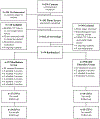Mindfulness-based group intervention in adolescents at-risk for excess weight gain: A randomized controlled pilot study
- PMID: 31112737
- PMCID: PMC6585452
- DOI: 10.1016/j.appet.2019.05.022
Mindfulness-based group intervention in adolescents at-risk for excess weight gain: A randomized controlled pilot study
Abstract
Objectives: To assess feasibility/acceptability of a mindfulness-based approach to excess weight prevention in adolescents at-risk for excess weight gain. To pilot test efficacy of a mindfulness-based intervention for improving food reward sensitivity, stress-eating, executive function (EF), and BMI/adiposity.
Methods: A pilot randomized controlled trial was conducted with 12-17y adolescents at-risk for excess weight gain based on above-average weight (body mass index [BMI]≥70%ile) or parental history of obesity (BMI≥30 kg/m2). Adolescents were randomized to a mindfulness-based (n = 29) or health education control group (n = 25) that met for six weekly one-hour sessions. Feasibility/acceptability were determined from attendance and acceptability survey ratings. At baseline, six-week and six-month follow-up, adolescents' perceived stress was measured with the Perceived Stress Scale, food reward sensitivity with a behavioral task, stress-eating during a laboratory test meal, and EF with the parent-reported Behavior Rating Inventory of Executive Function and NIH Toolbox. At the same intervals, BMI indices and body fat by air displacement plethysmography were assessed in a fasted state.
Results: Median session attendance was 6:6 sessions in both conditions; program acceptability ratings were above-average. Compared to health education, adolescents in mindfulness had lower food reward sensitivity at six-months (Cohen's d = 0.64, p = .01). There were no between-condition differences in BMI (mindfulness vs. health educationΔsix-months 95%CI 0.20, 1.52 kg/m2 vs. 0.21, 1.62 kg/m2) or adiposity (-3.64, -0.61% vs. -4.31, -1.04%) changes.
Conclusions: A mindfulness-based group intervention is feasible/acceptable among adolescents at-risk for excess weight. In this pilot sample, mindfulness and health education were equivocal for BMI/adiposity outcomes. Future trials with a larger, adequately-powered sample and longer-term follow-up are necessary to test efficacy of a mindfulness-based intervention for food reward sensitivity, stress-eating, EF, and stabilizing growth trajectories in youth at-risk for adult obesity.
Trial registration: ClinicalTrials.gov NCT03085160.
Keywords: Adolescent; Mindfulness; Obesity; Prevention; Randomized controlled trial.
Copyright © 2019 Elsevier Ltd. All rights reserved.
Conflict of interest statement
References
-
- Alberga AS, Sigal RJ, Goldfield G, Prud'homme D, & Kenny GP (2012). Overweight and obese teenagers: Why is adolescence a critical period? Pediatr Obes, 7, 261–273. - PubMed
-
- Birch LL, & Fisher JO (1998). Development of eating behaviors among children and adolescents. Pediatrics, 101, 539–549. - PubMed
Publication types
MeSH terms
Associated data
Grants and funding
LinkOut - more resources
Full Text Sources
Medical
Miscellaneous


